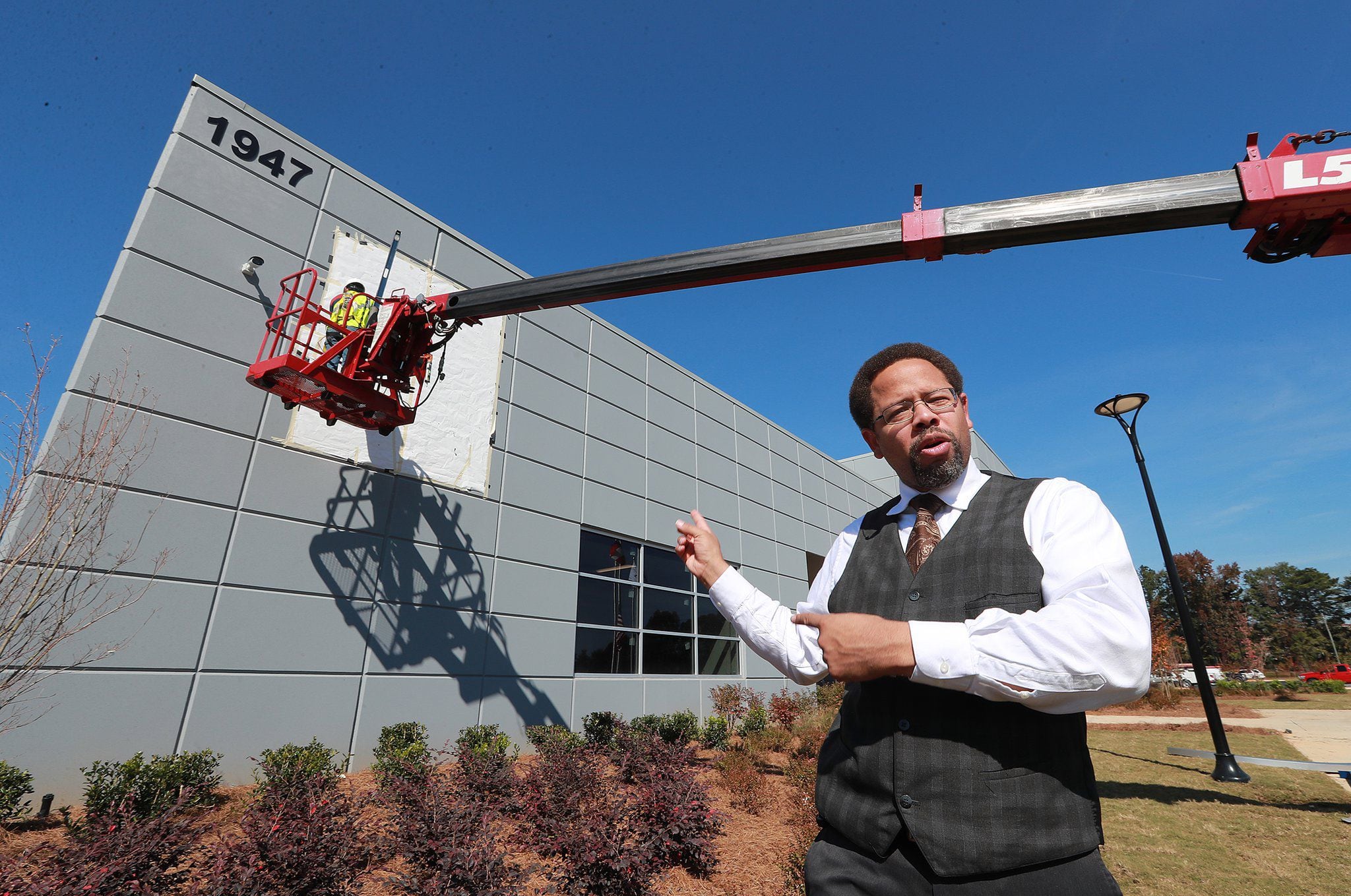Clayton officials missed red flags in approving $800M ‘Roman’ project

As a novice developer and Clayton County’s development authority were nearing a deal in the fall of 2021 to provide land for an $800 million high-rise project, top county officials demanded information about his financial capability.
Developer Jacques Roman emailed a three-page “conditional commitment” letter to the head of Invest Clayton that said overseas investors had almost exactly $100 million in an Australian bank account. Roman’s financial partners went further, saying they were “prepared” to invest up to $350 million in the project — a combo of futuristic condos, office towers, a hotel and an amphitheater on the site of a dilapidated grocery store.
Just two hours later, Invest Clayton Executive Director Larry Vincent said he’d forward the document to the county’s chairman.
“Looks great,” Vincent wrote in a Sept. 28, 2021, email, “and I will deliver it tomorrow!”
Three weeks later, Invest Clayton inked a development agreement with the intent to grant Roman’s company, Roman United, a half-century lease on 26 acres in Lake City at $10 a year. Clayton commissioners, meanwhile, committed $4 million in taxpayer funds to build a small business incubator there.
In interviews with The Atlanta Journal-Constitution, Vincent said he took no steps to verify the contents of the letter or background the partners.
Had some questions been asked, officials might have discovered several red flags. The man who signed the letter, Vaughn Richmond, who identifies himself as an executive for a Singapore-based wealth management firm, is a twice-convicted felon who spent a year in prison for his involvement in a wire fraud case. This week, Richmond told the AJC that investors “hadn’t come to a clear understanding” with Roman when the commitment letter was sent and that it wasn’t binding.
An AJC review of hundreds of pages of deal documents and emails and interviews with key players raises serious questions about Invest Clayton and the county’s examination of Roman and his partners before officials granted him prime land near Clayton State University and a multimillion-dollar county construction contract.

Invest Clayton, the county agency tasked with recruiting jobs and investment, can void the lease if certain conditions are not met. But if Roman is unable to fulfill his vision, it could lead to the property remaining in limbo for years.
Controversy has surrounded The Roman ever since the developer held lavish groundbreaking ceremonies for the project last August. An investigation by the AJC last year found Roman embellished his development experience on his website, went through a recent eviction and promised an aggressive development timeline before obtaining a single permit.
The county, frustrated by inaction, has signaled in recent weeks it wants back $559,000 it’s already paid Roman for the incubator.
Roman did not respond to repeated requests for comment made via phone calls, emails and a reporter’s visit to his office. But in a press release Wednesday, in an apparent reference to AJC reporting, he wrote that “public disclosure of confidential financial information serves as an attempt to undermine the project’s success.”
Roman also announced a recent construction contract and that after a “review” of financial agreements, the company decided to “streamline our financial partnerships.” He said he holds “a number of mutual non-disclosure agreements” with domestic and international partners, but did not elaborate.

In an interview, Richmond said his previous legal trouble doesn’t affect his role connecting wealthy overseas investors with development projects, such as The Roman. Richmond insisted the Australian investor money is real. But he said he didn’t know Roman and county leaders had held a ceremonial groundbreaking and that he’s mostly been in the dark on the project’s progression.
“I haven’t been in touch with them (Roman) for some time. In fact, I wasn’t sure if they were still going forward,” he said. “... I could easily rescind my letter, because I don’t know where they are on the project.”
County leaders, meanwhile, displeased after six months of inactivity, have begun to blame Invest Clayton.
“The development authority was supposed to vet all of that, all of the information provided to us,” Clayton County Chairman Jeff Turner said.
‘I did not dig into it’
Clayton County is among the more economically troubled Atlanta suburbs. It was crushed by a double whammy of the housing crisis and temporary loss of its school system’s accreditation in 2008.
The county’s unemployment rate trails that of the Atlanta region, and Clayton lacks major retailers like Target and Old Navy that are found in most similar-sized counties.
The vacant Ingles store at 5711 Jonesboro Road has held promise for revitalization of tiny Lake City for years. More than a decade ago, Invest Clayton officials pitched the site nine miles from Hartsfield-Jackson International Airport for a movie studio and film industry-related businesses, shops and apartments. But as studios sprouted across the region, the Lake City site went nowhere.
Invest Clayton is appointed by the county commission but acts independently. Then-Executive Director Khalfani Stephens, issued a new request for proposals (RFP) for the property in September 2019. Roman’s pitch caught the eye of development authority leaders, including Vincent, who was the board’s co-chair at the time.
“(Roman United) had the like-minded vision to do something here that’s going to change the county,” Vincent said.
Vincent succeeded Stephens in July 2020.
The Roman development includes these proposed elements
- A 17,000-square-foot small business incubator that could be made solely of 3D-printed materials. Clayton County will use $4 million in SPLOST funds to finance this aspect of the project.
- Two 27-story condos towers that each include about 780,000 square feet of space. Each building will include 400 condos, a penthouse, a rooftop pool and ground-floor retail space.
- A 25-story luxury hotel with 365,000 square feet of interior space, including ground-floor retail. There will also be an “endless pool” on the 16th floor, encircling the tower.
- A 25-story office tower with nearly 420,000 square feet of Class A office space. The ground floor will be retail space.
- A 7,500 seat amphitheater with a partially retractable roof. The entrance will be surrounded by retail space and places for street food vendors.
For the next 18 months until Invest Clayton and the developer reached their lease agreement in December 2021, Vincent oversaw all of the documentation his authority signed with Roman United. But Vincent said Stephens performed all the necessary vetting early in the RFP process.
“I did not dig into it, because that is what was approved by our previous board,” Vincent said. “So I took it at face value that the vetting took place, and to me the vetting means all of the vetting. I did not go back and re-vet.”
Stephens, now in government in Michigan, said on Friday that Vincent is trying to shift blame. “The actual final vettings and approvals happened well after I left,” he said. “When I left the only thing that had been decided was we want to move forward with working with Roman United.”
Clint Mueller, director of government affairs for Association County Commissioners of Georgia, said due diligence is essential when granting land rights or taxpayer dollars.
“Whoever signed off on that agreement, it’s their responsibility to make sure they’re dealing with a reputable entity,” he said.
Foreign bank accounts and promises
The conditional commitment letter Roman sent was from wealth management firm Atreides PTE LTD, signed by Richmond, its corporate director. The letter included a screenshot of a “Proof of Account Balance” form from Australian bank Westpac, showing $100 million in the account of an entity called Southern Pastoral Group PTY LTD.
Westpac did not respond to requests to verify the bank account’s legitimacy. Neither Southern Pastoral Group nor Atreides appear to have an online presence.
Richmond, who is based in New York, said one of his partners with Atriedes is the director of Southern Pastoral Group. The letter said they agreed to provide up to $350 million to Roman United if certain conditions were met, including approvals by government agencies.
“I was very reluctant to write the (conditional commitment) letter,” Richmond told the AJC on Tuesday. “I thought they were too soon, they weren’t ready, and we hadn’t come to a clear understanding yet.”
Summey Orr, a partner with the Hartman Simons & Wood law firm who focuses on commercial real estate, said the letter does not include the typical information needed to co-sign such a large project, and wouldn’t qualify as a letter of credit or proof of funds.
“You can’t look at (the letter) on its face and say, ‘Oh OK, this is fine.’ You have to keep digging into it to figure out who is behind this,” he said. “Who wrote this? And is this someone that I can rely on?”
Foreign investment in Atlanta and the United States is not rare. Jamestown Properties, the developer behind Ponce City Market, is among Orr’s clients and raised money across the globe.
According to federal court records in New York, Richmond pleaded guilty in 2011 to four counts including conspiracy to commit wire and bank fraud. He served a year in prison. Richmond pleaded guilty again in 2016 to conspiracy to commit wire fraud and was sentenced to time served.
Richmond said he was a victim of circumstance in the 2008 mortgage crisis and his second conviction stemmed from missing obligations due to his legal troubles, which led his attorneys to recommend he take a plea deal. He said his relationship with Atriedes predates his convictions and the firm kept him on once his time behind bars and probation was finished.
In an interview March 16, the AJC informed Vincent of Richmond’s past. Vincent said it didn’t alter his support of the project.
“This is pretty much a virgin start-up,” he said. “I feel once we start and build the money-making ends of this, like the arena, the hotel and the condos, the revenue will flow and the investors will come.”
Our reporting
An AJC story last September raised questions about the development team behind The Roman, a futuristic $800 million high-rise project in Clayton County. The newspaper revealed the project’s developer embellished his project portfolio and lacked the permits and state planning approvals to meet his aggressive development timeline. In today’s story, interviews and hundreds of pages of records examined by the AJC raise new questions about red flags missed by county officials in their vetting of the project.
Earlier this month, Roman signed a nearly $300,000 pre-construction contract services agreement with Roy Anderson Corp., a subsidiary of construction giant Tutor Perini. Vincent told the AJC a big name wouldn’t join this project unless it was promising and held up to scrutiny.
Robert Fullington, president of Roy Anderson Corp., said they are only obligated to provide pricing and feedback on the project’s first phase as submitted by Roman and the project’s architects.
An empty office
Founded in 2019, Roman’s company has never completed a project of this magnitude.
A reporter recently visited Roman United’s listed office at Buckhead’s 3379 Peachtree building, which consists of virtual office spaces available to rent for $99 a month. Brittney Ellis, office manager for virtual office manager Opus, said she’s never met Roman.
“They’ve never been to this office ever, I know that,” she said.
The county has paid Roman $559,000 for incubator design and preparation work, even though the project site has yet to be rezoned and Roman has yet to apply for any construction permits. The shuttered Ingles remains standing, with a dry cleaner and Dollar General continuing to operate on the property.

On Jan. 4, the county’s attorney emailed Roman to ask for more detail on how the most recent payments have been used or else “the county reserves the right to pursue all available remedies to recoup the expenditure of these funds.” County leaders declined to say whether Roman responded to their request.
Roman has not been present at recent Clayton County commission meetings despite requests from frustrated public officials.
On March 14, Vincent told commissioners that it would be a waste of Roman’s time for him to appear and answer questions, since the county-funded incubator is likely going to be the subject of future lawsuits.
Commissioner Alieka Anderson called it “deflection.”
“(Invest Clayton) can do what they want to do, but as far from our side, from the commission side, it’s over,” she said.
-
Sept. 16, 2019
Invest Clayton posted a request for proposals for the 5711 Jonesboro Road site.
-
Oct. 2, 2019
The window for RFP submissions closed, with Roman United submitting one of the three applications Invest Clayton received.
-
Feb. 5, 2020
Khalfani Stephens, the executive director of Invest Clayton, resigns to take a position as economic director of Flint, Michigan.

-
July 28, 2020
Larry Vincent, who had been on the board since January 2019, was selected as Invest Clayton's new executive director.
-
Feb. 10, 2021
Invest Clayton and Jacques Roman, the head of Roman United, sign their first agreement for The Roman project, a memorandum of understanding.
-
Sept. 29, 2021
Roman emails Vincent the conditional commitment letter from Adriedes PTE LTD, which is signed by Vaughn Richmond.
-
Oct. 19, 2021
Roman United, Invest Clayton and Clayton County sign a development agreement, which includes the $4 million in SPLOST funds for the small business incubator.

-
Dec. 14, 2021
Roman United and Invest Clayton sign a $10-per-year ground lease for the 26-acre Jonesboro Road property. Roman pre-paid $100 to cover the first decade.
-
Aug. 26, 2022
Roman United holds two ceremonial groundbreaking events to announce The Roman project.
-
Sept. 2, 2022
The Atlanta Journal-Constitution publishes its first story on The Roman, revealing the developer's misattributed project portfolio and raising other questions about its feasibility.

-
Jan. 4, 2023
Clayton County Attorney Charles Reed Jr. emails Roman to ask for more information on the $559,000 the county paid so far for the incubator, adding that legal action is possible.
-
March 7, 2023
Roman United signs a pre-construction services agreement with Roy Anderson Corp., a subsidiary of Tutor Perini Corp.

-
March 14, 2023
Vincent shows up to a commission meeting without Roman. He declined to talk about the incubator, since he said legal action seemed imminent.
More Stories
The Latest


